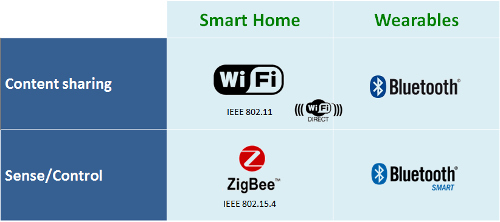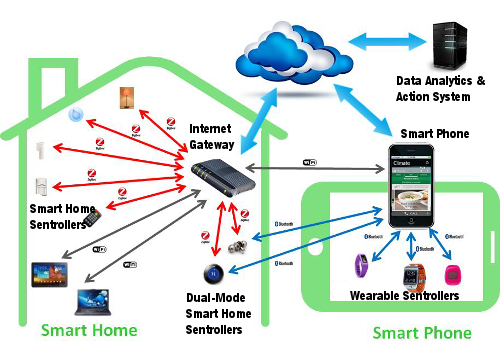 |
| November 25, 2014 | Volume 10 Issue 44 |
Designfax weekly eMagazine
Archives
Partners
Manufacturing Center
Product Spotlight
Modern Applications News
Metalworking Ideas For
Today's Job Shops
Tooling and Production
Strategies for large
metalworking plants
Bluetooth and ZigBee: A new standards war brewing?
 By Cees Links, Founder and CEO, GreenPeak Technologies
By Cees Links, Founder and CEO, GreenPeak Technologies
The recent announcement of Bluetooth Mesh is yet another attempt of Bluetooth to get into the networking space. Over 15 years ago, Bluetooth tried to oust WiFi as a networking standard. That attempt failed miserably, as WiFi has become the de-facto wireless networking standard in homes, buildings, and public spaces worldwide. Now Bluetooth is giving it another try -- attempting to displace ZigBee and other IEEE 802.15.4-based networking technologies like Thread as the low-power networking standard.
Will it be successful this time? Probably not, as the world will soon discover that WiFi, ZigBee, and Bluetooth all have their strong areas and that utilizing these strengths in a coordinated way can help the Internet of Things grow. But there is another lesson as well. Fighting each other will only slow down market acceptance and prevent the market from developing.
In 1998, the announcement of Bluetooth by its founding members Ericsson, Nokia, Intel, and Toshiba impressed the world. Since then, Bluetooth has become a household name, and the Bluetooth Alliance (special interest group) now counts more than 20,000 members (2014). Most of today's laptops and smartphones have Bluetooth. In addition, Bluetooth can be found in many peripheral devices that connect to them (headsets, keyboards, mice, sound bars, etc.). Bluetooth has also become a convenient communication method to connect a phone to a car. Today, it is hard to think about a world without Bluetooth.
One of the major problems of Bluetooth, its relative short battery life, has been addressed with Bluetooth Smart (Bluetooth Low Energy), enabling devices to run on smaller batteries for a longer time, thereby opening a market of wearables, from fitness bands to step counters, as well as many (medical) devices, like wireless blood pressure and heart-rate monitors. It is obvious that Bluetooth will be one of the key players of the emerging Internet of Things, and that the future will only encompass more and more Bluetooth devices.
However, there is a big problem. Despite its success, Bluetooth is not living up to one of the most daring commitments that really impressed the world in 1998: Bluetooth will make WiFi irrelevant, or as one of the participating executives framed it at the time: "Bluetooth will wipe WiFi from the face of the Earth!"
Today, this statement just sounds weird and outlandish, almost laughable, but at that time, when WiFi also was just emerging, it was taken very seriously because of the big names behind it. The end result was that a standards war was ignited that caused significant delay in market acceptance of both WiFi and Bluetooth.
In 1999, the world woke up to the potential of WiFi, when Apple embraced WiFi in the iBook and the Airport router. Intel, one of the founding members of the Bluetooth Alliance, very quickly realized that it would require a lot of effort to transform Bluetooth into a networking technology that was almost as good as WiFi, so, why make the effort? Instead, they decided to become a member of the WiFi Alliance and launched the famous Centrino chipset. WiFi was there and was ready to go.
In the following years, the world of electronics and computing discovered that there were tremendous benefits from both WiFi and Bluetooth. A clear communication emerged of which technology could be used best for what type of application. WiFi for networking (of computer equipment) and Bluetooth for connectivity (between computers and devices). After the dust settled, other companies like Atheros (now Qualcomm), CSR (now Qualcomm), and Broadcom followed this new world order, and all enjoyed tremendous growth from this broad market acceptance. The war was over.
Fast forward to 2014. Both WiFi and Bluetooth wireless have become very popular, but battery life is still a big issue -- not so much for laptop computers, tablets, or smartphones, which enjoy daily recharging schedules, but especially for the many small sentrollers (sensors, actuators, controllers) that are the essential building blocks for the Internet of Things. Fortunately, the industry has been working on low-power versions for both technologies already: ZigBee (based on IEEE 802.15.4) as "low-power WiFi" and Bluetooth Smart (Bluetooth Low Energy) as "low-power Bluetooth." As a result, two new, very large markets for low-power, battery-operated devices are emerging -- one for the market of the Smart Home and one for the market of the wearables.
Today, the Smart Home market is using IEEE 802.15.4-based ZigBee or Google's Thread (also IEEE 802.15.4 based) as the preferred low-power networking technology. IEEE 802.15.4/ZigBee is already built in to many set-top boxes (along with WiFi), routers, and gateways, and it is rapidly gaining in popularity for applications like security, energy management, and assisted living.
The market of the wearables is also burgeoning. This includes many new devices that connect to a smartphone using Bluetooth Smart, which is also the right technology to connect our smart watch or smart glasses, fitbits, and other devices to our smartphone. Simple, straightforward, and so far, so good! The following table provides a good overview of where and how the different technologies fit.

Figure 1. Table positioning WiFi, Bluetooth (Smart), and ZigBee.
Well, it may be not so clear anymore.
In 2014, Bluetooth Mesh was announced as a mesh networking capability on top of Bluetooth, with the clear intent that Bluetooth now also can be used as a (Smart Home) networking technology. By doing so, Bluetooth is doing something not much different than what it did back in 1998: claiming the networking space from ZigBee in the same way as it tried to do so from WiFi. Implicitly, this announcement is saying, "Bluetooth will wipe IEEE 802.15.4/ZigBee/Thread from the face of the Earth."
What will be the consequence? Another standards war? The market stalling again? Or will wisdom decide? And what will that wisdom be?
Sooner or later, the market will come to the same conclusion as it did before, when WiFi and Bluetooth ended the earlier standards war.
Yes it is true -- with a great deal of effort Bluetooth can indeed be transformed into something almost as good as ZigBee. But it requires a lot of work to transform a connectivity technology into a networking technology. This involves solving the challenges of system level-wide security, ease of installation, low latency (where needed), and standardization in the application languages for lighting, climate control, security, care, retail, etc. The members of the ZigBee Alliance have already dedicated years of work into this, work that, to a large extent, will need to be redone to bring Bluetooth Mesh up to the same level of technical success as ZigBee is today.
Sure, it can be done, but why bother? After a lot of investment, developing an alternative to a solution that already exists in the market and functions well does not make a lot of sense. There is a place for both communication technologies. Both technologies have their merits and will be key for the Internet of Things in the Smart Home as well as for the wearables. And there will be interconnects between Smart Homes and wearables. For instance, having a smartphone as a key fob talking (via Bluetooth) to a door lock, where the door lock itself also talks ZigBee to the router, allowing it to be controlled over the Internet as well.

Figure 2. WiFi, Bluetooth (Smart), and ZigBee in the Smart Home and the smartphone.
Therefore, just like there are WiFi/Bluetooth combo products today capable of "talking" both WiFi and Bluetooth, there will be devices in the future that can "talk" both ZigBee and Bluetooth. Trying to pit one technology against the other does not do right to either of them, creates a standards war, and stalls the market.
The IoT market is the real "next thing," and if the predictions are correct, it will be much larger than what we can imagine. It will change how we live our lives.
The announcement of "Bluetooth Mesh" earlier this year reminds me of the famous statement from Edmund Burke (1729-1797): "Those who don't know history are destined to repeat it."
Hopefully, the industry will not have to experience this standards war again and has learned how the various technology sectors can work together for mutual benefit.
Published November 2014
Rate this article
View our terms of use and privacy policy
